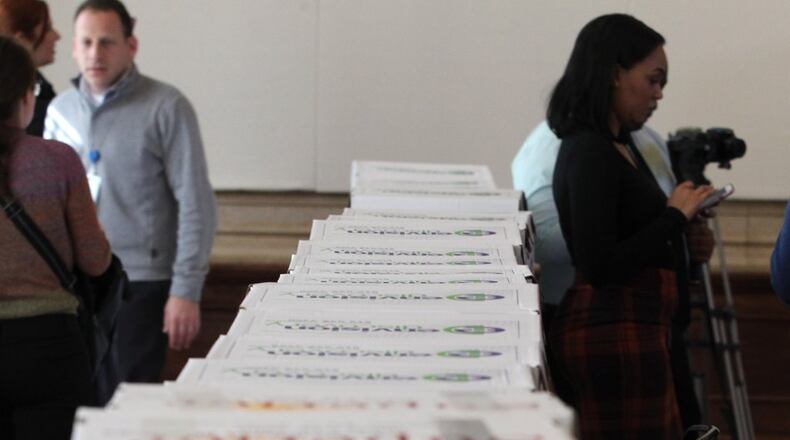Atlanta Mayor Kasim Reed, hoping to convince the public he supports transparency and trying to protect his legacy, released a mind-boggling 1.476 million documents on Thursday related to the ongoing City Hall bribery probe.
In a sometimes combative and sometimes conciliatory half-hour press conference, Reed said he had not been questioned by federal authorities in the investigation and expressed irritation that the alleged bribery took place on his watch.
“I can’t express how frustrated and angry I am about what has happened,” Reed said. “But the fact of the matter is that I have a job to do and a city to run. I’m going to fully comply and cooperate. Justice is going to be served.”
The documents filled hundreds of white cardboard boxes, many stacked up waist high against walls and spread out over rows of tables in the cavernous old City Council chambers.
Reed used some of the boxes as the backdrop for his remarks, creating a six-foot wall behind him.
“These documents are being made available free of charge in the public interest,” Reed said, though he said he did the cost to the city to prepare the documents. “The only redactions are for privacy related information.”
The document release comes a day after Lithonia contractor Charles P. Richards, 64, was led into federal court in handcuffs and leg irons on charges of conspiracy to commit bribery in order to obtain city of Atlanta contracts.
Richards’ charges follow the conviction last month of Elvin “E.R.” Mitchell on conspiracy to commit bribery in City Hall contracts.
Federal authorities say more than $1 million in bribes were allegedly paid by contractors for the contracts between 2010 and 2015.
In addition to asking the city for records about Mitchell and Richards, investigators also subpoenaed the city for records involving Mitzi Bickers, who helped Reed win election in his 2009 campaign and is a former member of the Atlanta Schools Board of Education.
Reed said Thursday he had not been interviewed by authorities in the probe and pushed back on any suggestion he may have been involved.
“I’ve given my life to this job for seven years,” he said. “Day in and day out, I have poured myself into this job. I wanted to be mayor of Atlanta since I was 13. If you think that I would throw my life away for some short-term gratification, you don’t know me well and the plans that I have for my own life.”
When asked about his reaction to Mitchell and Richards, Reed said he was deeply frustrated and angry.
“The bottom line is in the last seven years we have accomplished extraordinary things as an administration,” Reed said. “And in the last year of my administration I’m in the old City Council chambers dealing with this issue.”
He declined to discuss Bickers, saying that it was well known that she worked on his campaign as well as in his office as director of human relations. But he said since the investigation was ongoing. he would have no further comment.
‘Interest of transparency’
The search through the mountain of papers got off to a rocky start. Reporters from The Atlanta Journal-Constitution found dozens of blank pages as well as documents whose type were too small to read, prompting questions about preparation of the release.
Reed’s staff shot back that the blank pages were in fact part of the documents turned over to federal authorities, but that all the information on them had been redacted and thus a blank page created. Furthermore, the staff said the city decided not to change the original size of illegible pages to avoid the appearance of manipulating any documents.
The city later walked back its stance on the legibility, saying they would try to correct the problem.
“The city of Atlanta released more than 1.4 million pages of documents to the press and public today in the interest of transparency,” city attorney Cathy Hampton said in a statement late in the day.
“City staff did not review the documents prior to delivering them to the press, and therefore were unaware that certain printed documents were difficult to read,” Hampton said. “We are working with our third-party vendor to provide an immediate solution, and will share legible, clear documents as soon as possible.”
The mayor also spared with some in the media about why the documents were not made available electronically. Reed said the information provided to federal authorities included personal information and that he wanted to get redacted copies out quickly in paper form.
An electronic file is forthcoming, Reed said, though he didn’t provide a timetable.
“The documents were delivered to the Justice Department in an electronic form,” he said. “The reason that we delivered them in the fashion that we did today is because we were trying to get them out as quickly as possible.”
Reed said that the city is not doing an internal investigation, but suggested it might once the Justice Department’s work has been completed.
“We have to deal with this very terrible situation, root those individuals out and learn from these lessons,” he said.
Reed repeated often throughout the press conference that he has had a strong record as mayor, a nod toward the impact the results of the investigation could have on his legacy.
But when asked if that was something he worried about, he demurred.
“As it relates to my legacy, I’m not thinking about that right now,” he said. “I believe my legacy is to get up, to keep the team that I have built intact. We have an enormous number of things that we’re working on and that’s why it’s very important that the public have confidence that we’re doing everything that we can to cooperate.”
About the Author
Keep Reading
The Latest
Featured



